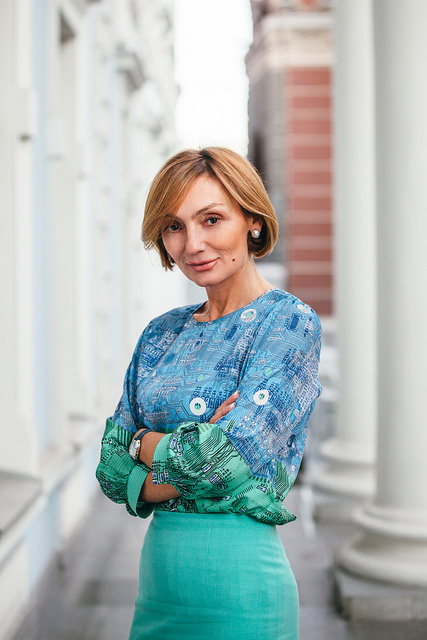 Kateryna Rozhkova is the First Deputy Governor of the National Bank of Ukraine.
Kateryna Rozhkova is the First Deputy Governor of the National Bank of Ukraine.
She has been working in Ukraine’s banking system since 1998.
For more than 12 years, she held a variety of management positions in the private and public sector. These have included working as a deputy chair, board member, and advisor to the chairman of the board at Erste Bank PJSC, deputy chair of the board at Finbank PJSC, and acting chair of the board at Platinum Bank PJSC. In 2009, she worked as the director of the NBU Off-Site Supervision Department for six months. Between 10 June 2015 and 18 January 2016, she held the position of director of the Banking Supervision Department at the NBU. Between 25 October 2016 and 15 June 2018 she worked as the NBU Deputy Governor in charge of prudential supervision before being promoted to her current role of First Deputy Governor.
Kateryna Rozhkova graduated from the Kyiv National Economic University with a major in Finance and Credit – Bank Management.
She also holds a degree in International Business Management (MBA) from the International Institute of Management (IMI-Kyiv).
Tell us a bit about yourself, background and your current role
I am the First Deputy Governor of the National Bank of Ukraine (NBU), responsible for prudential supervision throughout Ukraine’s banking sector. I joined the NBU following two decades of experience working for Ukrainian commercial banks.
It hasn’t actually been finance all the way. I started my career as a schoolteacher but knew it wasn’t my calling. I went back to university and changed my life totally, embarking on a new career after graduating. I started off as an economist, rising to the position of Director of the Finance Department at Aval Bank, and then at Platinum Bank in Ukraine.
I left the private sector in 2015 and joined the NBU as part of the bank’s agenda of change and reform to build a modern Ukraine, following the Revolution of Dignity 2014. I’ve not looked back since – it’s been an exciting, challenging effort and I know my work is having a measurable improvement on the lives of everyday Ukrainians. It’s a very rewarding role.
Did you ever sit down and plan your career?
I think my career has been a combination of my determination to pursue my interests and the support of those around me. I knew I had an interest in finance and economics early on and when I finished my Masters, I was really excited to get my first role at a bank and have the chance to apply everything I had learnt. Since then, I have worked very hard but my peers, my colleagues and my family have been invaluable in shaping my career. Without their encouragement, I might not have thought to apply for certain jobs or seek new avenues for career development.
Have you faced any particular challenges along the way and if so, how did you deal with them?
The work that the NBU has done in Ukraine has faced numerous challenges and obstacles from old elites who did not wish the situation to change. By playing such a high profile role in the clean-up of the banking sector, I’ve faced a lot of criticism. I’ve been targeted online, I’ve been threatened and been harassed. Unfortunately, this has not been unique to me – it’s happened to colleagues both male and female. I think that we all gain strength in the fact we’ve experienced such negative reactions together. A good team makes challenges like these much easier to bear. As long as we continue to support each other as a team, continue to work hard and continue build a better future for Ukrainians, criticism is easy to brush off.
I’d recommend turning to your team if you find yourself facing any problems. The people around you are your biggest source of strength and encouragement in any workplace.
If you could change one thing for women in the workplace, what would it be?
I wish there were more opportunities for women to access finance around the world. Being able to access finance means women can start their own businesses and engage with the economy on a level playing field. We’ve often all got intense schedules, and we regularly have to combine work and family commitments in a way that men don’t. Here access to finance is crucial, to give women the flexibility to shape their own working life and build a career that works for them, rather than somebody else. Women are incredibly entrepreneurial and I’d like to see more of us flexing these muscles!
In my role at the NBU I’ve been made aware of an emerging group of female entrepreneurs across Europe, who are building apps and digital financial services for women. These apps and services offer additional options and resources for women looking to finance their enterprises – making working and living easier. I look forward to watching these technologies develop. The more opportunities there are for women to access capital, the more women will be able to thrive in their professional lives.
How do you feel about mentoring? Have you mentored anyone or are you someone’s mentee?
I wouldn’t be where I am today without the help of the many mentors I’ve had over the years. I’ve been very lucky at the NBU: I had the brightest, most shining example of a successful women to look up to. Valeria Gontareva is our ex-Governor, and has been one of the leaders of reform in Ukraine. Her professionalism and leadership have been praised by our international partners, international donors, financial experts and the global academic community. She’s been the driver of huge, often very difficult (but very much needed) changes in the financial sector. She is an excellent role model not only for me – but for all Ukrainian women and girls interested in finance.
I make sure that I act as mentor whenever I can. I work with so many brave and ambitious women, and it is an honour to help them foster their talents. Ukraine is a fairly unique case, in that we do have a high percentage of women who’ve been able to climb the corporate (and political) ladder. In Ukraine’s government, the Vice Prime Minister for European Integration, the Ministers of Health and Education, as well as many deputy ministers are strong female leaders who keep driving changes in the country. We all agree how important it is that women continue occupy seats at the top table – and so we work hard to bring the next generation with us.
What has been your biggest achievement to date?
When our reformist team took over the NBU in 2014, the central bank faced a huge task. Ukraine was facing a perfect storm, with macroeconomic, currency and banking sector challenges combined. A deep recession set in following Russia’s annexation of Crimea and armed conflict breaking out in the East of the country – just in the first quarter of 2015 Ukrainian GDP fell by 17.6% compared to a year earlier. In the banking sector, supervision was weak and money laundering was rife. Urgent action was needed to clean up the financial system and ensure its stability.
My team had to take decisive and dedicated action to address problems that had been building up for decades. We conducted stress tests and comprehensive asset quality reviews across the top banks in the country. We have improved our investigations capability to make sure that we can identify malpractice and deal with it effectively. We had to close down nearly 50 percent of all banks in the country and bring in new regulations to make bank ownership transparent. It has been a long and arduous task, and we’ve faced much opposition, but overall the NBU’s actions have helped secure the stability of my country. I couldn’t be more proud of this work.
What is your next challenge and what are you hoping to achieve in the future?
I received a promotion from Deputy Governor to First Deputy Governor in June 2018, and I’ve got a lot to look forward to as I take on this new role. With the successful completion of the clean-up of the banking sector under my belt, we’re now looking to build on this solid foundation and do more to support economic growth and financial stability in Ukraine.
We’re going to push forward with regulatory reform. Our current priorities include boosting bank lending to the real sector of the economy and ensuring that our new foreign exchange liberalisation policy makes the country more attractive to international investors. To achieve greater integration into the European economy, and our place globally, Ukraine must operate at the same level as its European counterparts. This means transparent operations, investor-friendly regulation and the financial stability required to work together with international businesses – and to stamp out corruption. With the EU-Ukraine Association Agreement now fully live, European banking regulations and corporate governance standards must become the norm across Ukraine’s banking sector and its economy more generally. It’s incredibly exciting and I relish the challenge.








